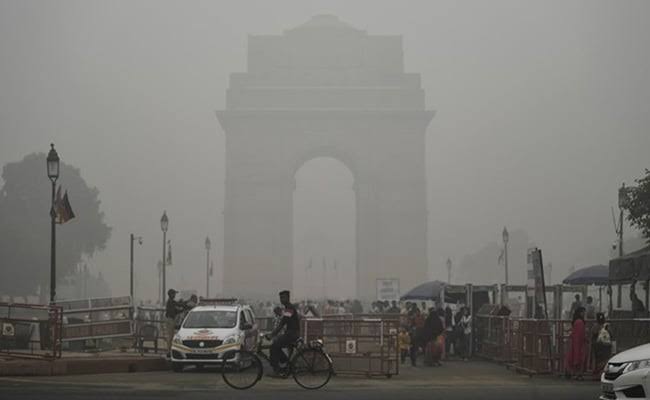A thick blanket of smog has enveloped the capital city since two weeks, making the act of breathing a risky affair. As per the data shared by the Central Pollution Control Board (CPCB), Delhi’s air quality index was recorded 494 at 4 PM on Sunday, 3rd October 2019, which turned out to be the highest since the year 2016 that was 497. In Lodhi Road and several other parts of Delhi, the PM 2.5 and PM 10 levels reached up to the hazardous mark of 804 μg/m3 and 979 μg/m3 while the safe limits are 60 to 100 respectively.
With such horrendous data, the air pollution crises in Delhi, as well as the neighboring cities, made Public Health Emergency literal and inevitable. As per the news report by News 18, AIIMS has witnessed a rise in number of patients in out-patient departments & emergencies with complaints of watery eyes, cough, breathing problems, asthma, and chronic obstructive pulmonary diseases (COPD). Children & the elderly are the worst affected population as toxic smog continues to choke the city.
What’s the take on smoggy Delhi
Industrial processes, construction, passenger vehicles, Diwali firecrackers, open burning of garbage and waste and stubble burning across the breadbaskets of India are major contributors to Delhi’s stubborn smog, which authorities are trying to control. Some of the initiatives taken by government include the commencement of odd-even scheme in Delhi, ban on stubble burning, shutting down of schools till the time air situation gets better and emphasis on cleanliness of the public spaces. It’s high time that people cooperate with government authorities to curb the curse of smog and save millions of lives from the impending health crises.
How to protect dear ones from the lurking threat
Respiratory problems and heart strokes are the most common health risks that a person is vulnerable to when air pollutants are at apocalyptic levels. So, the first step to protect oneself against extreme air pollution is to alter lifestyle and make required dietary changes following a precautionary approach. The sequential steps in detail are as follows:
1. Boost immunity:
A well-balanced diet is the key to strong immunity that fights back almost all sorts of attacks. Drink plenty of water and include food items such as fenugreek, okra, spinach, coriander, wholegrains, nuts and seeds that are rich in vitamins and nutrients in your daily diet. Fruits such as pears, guava, oranges, apricots, papaya, and tomatoes that are packed with antioxidants control free radical damage and improve immunity. As Vitamin E is considered to be the strongest antioxidant, amla, sunflower seeds, avocadoes, peanuts, bran oil, and pine nuts should be included in the diet. Jaggery is also beneficial in flushing out harmful toxins from the body. All of these items strengthens immunity to resist the respiratory diseases such as cold, cough and sore throat.
2. Wear masks
Though doctors strongly advise all to stay home at this time avoiding direct exposure to harmful air pollutants, people should wear masks if they have to step out of homes. High levels of PM 2.5 & PM 10, carbon monoxide, and greenhouse gases have engulfed the entire city. In such a case, wearing masks is more of a necessity. An air filtration mask should have a pore size of 2.5 micrometers or less and activated carbon layers and filters to block the PM 2.5 particles entering into the lungs. Masks N95 & N99 are effective and easily available in markets at reasonable prices.
3. Use natural air-purifiers
People tend to use air purifying systems at their homes and offices to inhaling toxic air. But, natural air purifying indoor plants such as Aloe Vera, Golden Pothos, Spider Plants and Snake Plants significantly help in curbing the air contaminants indoor. Also, avoid using air fresheners and burning candles as most of them contain particulate matter. Keep these plants in corner of your house to efficiently cleanse and regulate the air indoors. It is believed that eight plants are required per person to maintain the optimum levels of oxygen. So, plant Neem, Peepal, and Bargad trees in proximity to your house as these improve the air quality.
4. Opt for public transportation
If possible, please avoid private transportation at this time as vehicle emissions are adding up to the serious concern of smog. Instead, opt for eco-friendly mode of transportation. Connectivity is being enhanced in Delhi-NCR as DMRC & DTC has announced that they will be increasing the number and frequency of metros and buses respectively. Carpooling is also a good option for travelling to longer distance because 1 is always better than 2 cars.
5. Check the health of vehicle
Even when you are following odd-even scheme, keep track on the health of vehicle. Clean the fuel filters, oil filters and air filters on regular basis. Replace the old battery with a new one; ideally, the battery of car should be replaced in every three years. Maintain tyres well to reduce the exhaust emissions. On a traffic signal, turn off the engine as idling exhaust causes more pollution. Do not forget to get it checked by the authorized pollution check centre.



